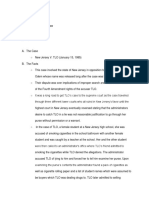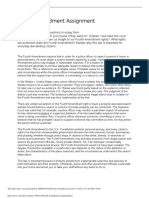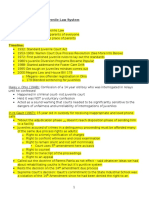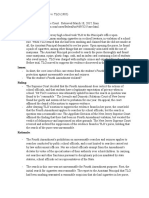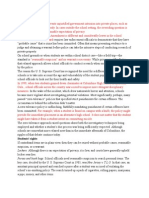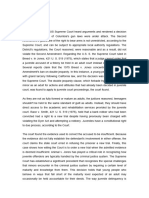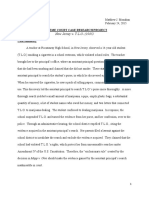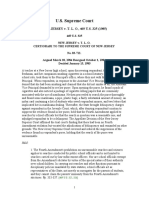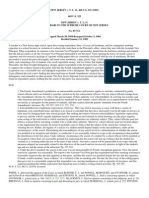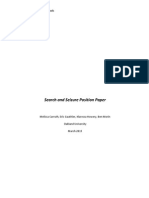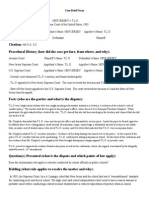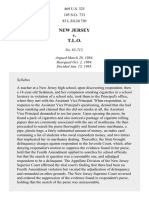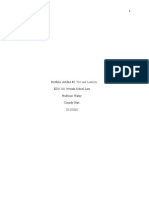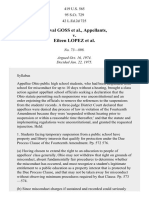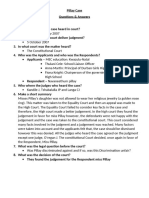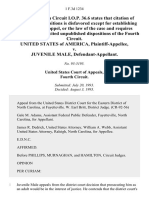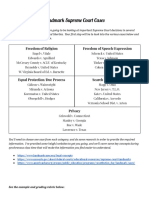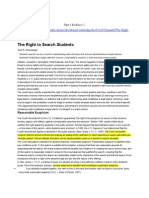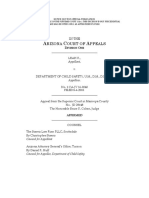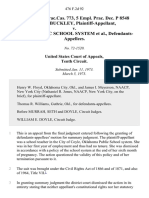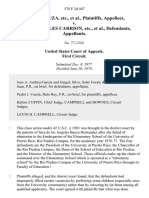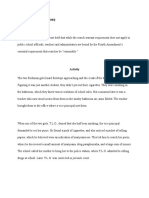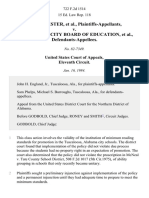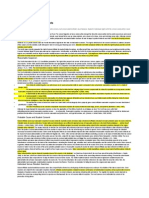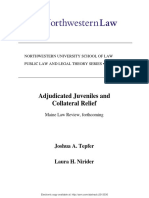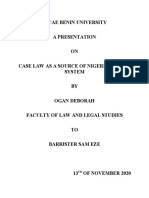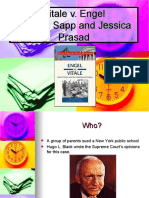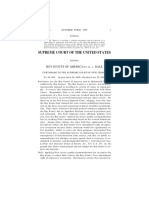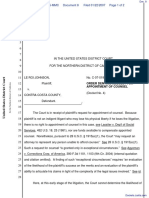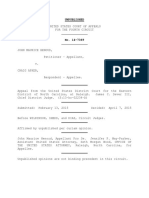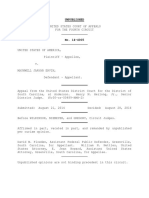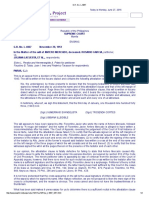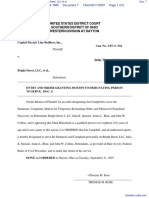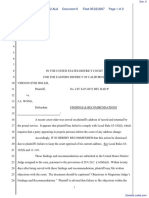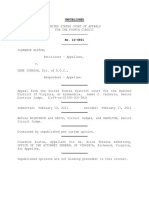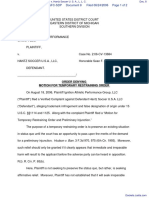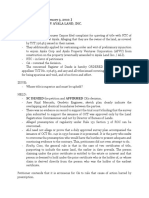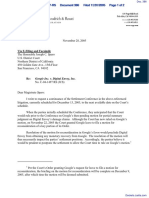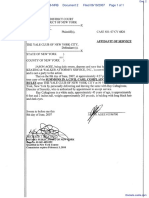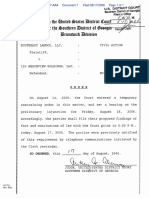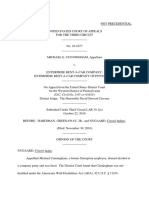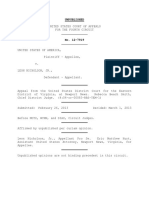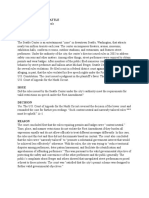Tims Part of Part 4
Tims Part of Part 4
Uploaded by
api-250473581Copyright:
Available Formats
Tims Part of Part 4
Tims Part of Part 4
Uploaded by
api-250473581Original Title
Copyright
Available Formats
Share this document
Did you find this document useful?
Is this content inappropriate?
Copyright:
Available Formats
Tims Part of Part 4
Tims Part of Part 4
Uploaded by
api-250473581Copyright:
Available Formats
Court Cases Used as References Goss v.
Lopez
Constitutional Question: Does due process get cancelled out depending on the crime committed? Background: Nine Students including Dwight Lopez got suspended from Central High School for 10 days for destroying school property and disrupting the learning environment. Lopez testified that 75 students have in the same day. Ohio law states you can suspend students up to 10 days. It has to be notified to the parents within the 24 hours. Courts Decision: The Court Split 5-4 held that the state had violated due process by suspending the students without a hearing. Students do not shed their constitutional rights at the schoolhouse door. Concurring or Dissenting Opinion: Justice Powell invite that dissent, the graved that the Ohio statute had granted the right to education but not the right to education with description he challenged the courts finding that the suspension was severe enough to bring the due process clause into play. Powell also argued that the safeguards provide by Ohio were sufficient. Explanation of Case: This case relates to Alexs and Mikes because they were suspended and expelled without due process. Alex and Mike were given an unnecessary punishment without getting a hearing and then punishment wasnt even needed at the time.
New Jersey v. T.L.O.
Constitutional Question: How far can search and seizure go in an investigation of a student? Background: Two Freshmen were caught smoking in the bathrooms. Smoking at school wasnt prohibited but students were only supposed to smoke in designated areas. Vice principal asked to see TLOs purse and he found the stuff but also found rolling paper which tied into Mary J. Then he went on and found drugs and money and was expelled from the district. Courts Decision: The Supreme Court in a 6-3 decision issued by Justice White, between the individuals even a childs, legitimate expectations of privacy and the schools interest in maintaining order and discipline with that being said New Jersey ended up winning the case. Concurring or Dissenting Opinion: In a separate concurring opinion, Justice Powell stated that students in primary and secondary educational settings shouldnt be afforded the same level of protection for search and seizures as adults. Explanation of the Case: This case was a lot similar to ours when it comes to searches. The principal searched her bag for the cigarettes but in plain view he also found rolling paper for Mary J, which gave him reason to continue searching.
Safford v. Redding Background: reports that drug dealing was happening. Prescription strength drugs were identified and the dealer was named. 13 year old Sarenna Redding, the suspect, was them strip searched and nothing was found.
Courts Decision: the court decided the search was unconstitutional. The facts may have been too elaborate and could have been false. The facts themselves even demonstrate a violation of Reddings rights.
Dissenting opinion: justices Stevens and Ginsburg dissented as to the qualified immunity. They explained to her the laws clearly, which stated whether the search has gone too far and these officials knew it and did it anyway. They had no reason to strip search Redding.
Explanation: this case blew me away. It shows just how far schools will push their limits, and almost like cops, abuse their power.
Board of Education v. Earls Constitutional Question: Amendment IV of the constitution.
Background: the families of Lindsay Earls and Daniel James believed random drug testing for extracurricular activities was unconstitutional.
Courts Decision: the courts decided that the school had no right to random srug tests as to there were no issues that would need it.
Summary: drug testing Alex was not legal because it was stated that the testing was random when it was actually targeted.
You might also like
- Go V Colegio de San Juan de LetranDocument2 pagesGo V Colegio de San Juan de LetranDana Mariz Santos Tumaque100% (1)
- The Role of Law in Social Work Practice and AdministrationFrom EverandThe Role of Law in Social Work Practice and AdministrationNo ratings yet
- Aurora Loan Services V Weisblum Apellants Brief 18 Aug 2010Document21 pagesAurora Loan Services V Weisblum Apellants Brief 18 Aug 2010William A. Roper Jr.No ratings yet
- Griswold V ConnecticutDocument2 pagesGriswold V ConnecticutZachary FigueroaNo ratings yet
- Artifact 3Document5 pagesArtifact 3api-459972343No ratings yet
- Troutman Appeal To Division OneDocument3 pagesTroutman Appeal To Division OneBigious BoiousNo ratings yet
- Court Case Tlo V New Jersey FinalDocument5 pagesCourt Case Tlo V New Jersey Finalapi-481391408No ratings yet
- Strip Search Final PaperDocument8 pagesStrip Search Final Paperapi-257252390No ratings yet
- Fourth Amendment AssignmentDocument3 pagesFourth Amendment AssignmentJan Laurince CabangonNo ratings yet
- I. History of The Juvenile Law SystemDocument14 pagesI. History of The Juvenile Law SystemLaurenMarieRobertsNo ratings yet
- Legal Brief New Jersey V TloDocument2 pagesLegal Brief New Jersey V Tloapi-30764129100% (1)
- Portfolio 3Document3 pagesPortfolio 3api-362634520No ratings yet
- Court Cases in American History2Document16 pagesCourt Cases in American History2christinesermons0No ratings yet
- Due Process PresentationDocument18 pagesDue Process Presentationapi-324270925No ratings yet
- UntitleddocumentDocument2 pagesUntitleddocumentapi-268989941No ratings yet
- Parts of The Case Summary Will BeDocument2 pagesParts of The Case Summary Will BeJohnray GalamayNo ratings yet
- 10 Supreme Court Cases Every Teen Should KnowDocument11 pages10 Supreme Court Cases Every Teen Should KnowBen LernerNo ratings yet
- Edld 620 - Monahan-Supreme Court Case New Jersey V T L oDocument10 pagesEdld 620 - Monahan-Supreme Court Case New Jersey V T L oapi-353224250No ratings yet
- 10 Supreme Court Cases Every Teen Should KnowDocument12 pages10 Supreme Court Cases Every Teen Should Knowapi-267224618No ratings yet
- The Right of Search and Seizure Within The School SettingDocument10 pagesThe Right of Search and Seizure Within The School Settingapi-151363557No ratings yet
- School Law-Chapter 3 OutlineDocument7 pagesSchool Law-Chapter 3 Outlineapi-291564671No ratings yet
- New Jersey v. TLO (1985)Document24 pagesNew Jersey v. TLO (1985)Ethan ArdeseNo ratings yet
- Molly Farrell, a Minor With Her Next Friend and Parent Marjorie Farrell v. Lewin Joel, Jr., Superintendent of Schools, Clinton, Connecticut Rexford H. Avery, Principal, the Morgan School Charles J. Poole, Chairman, Arthur L. Jennings, Neil E. Jensen, Edith MacMullen Kevin W. Leary, Ernest C. Burnham, Jr., and Robert L. Sheehan, Board of Education, 437 F.2d 160, 2d Cir. (1971)Document6 pagesMolly Farrell, a Minor With Her Next Friend and Parent Marjorie Farrell v. Lewin Joel, Jr., Superintendent of Schools, Clinton, Connecticut Rexford H. Avery, Principal, the Morgan School Charles J. Poole, Chairman, Arthur L. Jennings, Neil E. Jensen, Edith MacMullen Kevin W. Leary, Ernest C. Burnham, Jr., and Robert L. Sheehan, Board of Education, 437 F.2d 160, 2d Cir. (1971)Scribd Government DocsNo ratings yet
- DeCosta v. Chabot, 59 F.3d 279, 1st Cir. (1995)Document3 pagesDeCosta v. Chabot, 59 F.3d 279, 1st Cir. (1995)Scribd Government DocsNo ratings yet
- NEW JERSEY v. T. L. O.Document23 pagesNEW JERSEY v. T. L. O.gall4133No ratings yet
- The Pledge of AllegianceDocument6 pagesThe Pledge of AllegianceEluru SwathiNo ratings yet
- Part3 Evidence1 BarbourDocument3 pagesPart3 Evidence1 Barbourapi-283684657No ratings yet
- Oulaw SearchDocument7 pagesOulaw Searchapi-257598923No ratings yet
- New Jersey V T L oDocument1 pageNew Jersey V T L oapi-257598923No ratings yet
- Part3 Evidence3 BarbourDocument4 pagesPart3 Evidence3 Barbourapi-283684657No ratings yet
- Faye Elizabeth Hall, as Next Friend and Mother of Naomi Faye Hall, a Minor, and Faye Elizabeth Hall and Bervin E. Hall in Their Own Rights, on Behalf of Themselves and All Others Similarly Situated v. G. Garrison Tawney, Individually Bernard Claywell, Individually John Kingery, Former Superintendent of Schools for Roane County, in His Individual Capacity Myles Spencer, Jo Ann Moore, Melvin Smith, Cecil Taylor, and Harry Taylor, Members of the Board of Education of Roane County, in Their Individual Capacities and Lonnie Canterbury, Superintendent of Schools for Roane County, in His Individual Capacity, 621 F.2d 607, 4th Cir. (1980)Document11 pagesFaye Elizabeth Hall, as Next Friend and Mother of Naomi Faye Hall, a Minor, and Faye Elizabeth Hall and Bervin E. Hall in Their Own Rights, on Behalf of Themselves and All Others Similarly Situated v. G. Garrison Tawney, Individually Bernard Claywell, Individually John Kingery, Former Superintendent of Schools for Roane County, in His Individual Capacity Myles Spencer, Jo Ann Moore, Melvin Smith, Cecil Taylor, and Harry Taylor, Members of the Board of Education of Roane County, in Their Individual Capacities and Lonnie Canterbury, Superintendent of Schools for Roane County, in His Individual Capacity, 621 F.2d 607, 4th Cir. (1980)Scribd Government DocsNo ratings yet
- Evidence 2Document4 pagesEvidence 2api-268989941No ratings yet
- 71 Reymond B. Laxamana vs. Ma. Lourdes D. LaxamanaDocument2 pages71 Reymond B. Laxamana vs. Ma. Lourdes D. LaxamanaeNo ratings yet
- New Jersey v. TLO, 469 U.S. 325 (1985)Document50 pagesNew Jersey v. TLO, 469 U.S. 325 (1985)Scribd Government DocsNo ratings yet
- Portfolio Artifact 3Document5 pagesPortfolio Artifact 3api-413637437No ratings yet
- United States Court of Appeals, Eleventh CircuitDocument8 pagesUnited States Court of Appeals, Eleventh CircuitScribd Government DocsNo ratings yet
- Goss v. Lopez, 419 U.S. 565 (1975)Document28 pagesGoss v. Lopez, 419 U.S. 565 (1975)Scribd Government Docs0% (1)
- Pillay Case IURI 171Document2 pagesPillay Case IURI 171amoneNo ratings yet
- United States v. Juvenile Male, 1 F.3d 1234, 4th Cir. (1993)Document4 pagesUnited States v. Juvenile Male, 1 F.3d 1234, 4th Cir. (1993)Scribd Government DocsNo ratings yet
- Cartoon 10Document3 pagesCartoon 10api-356961980No ratings yet
- Tayler Ciarasso - Landmark Supreme Court CasesDocument5 pagesTayler Ciarasso - Landmark Supreme Court Casesapi-551984674No ratings yet
- Part3 Evidence2 BarbourDocument4 pagesPart3 Evidence2 Barbourapi-283684657No ratings yet
- Dr. Charles Edwards, Guardian For and in Behalf of Craig Alan Edwards, A Minor v. Dale Rees and Davis County School District, 883 F.2d 882, 10th Cir. (1989)Document6 pagesDr. Charles Edwards, Guardian For and in Behalf of Craig Alan Edwards, A Minor v. Dale Rees and Davis County School District, 883 F.2d 882, 10th Cir. (1989)Scribd Government DocsNo ratings yet
- Inquiry 2 Doc 1Document4 pagesInquiry 2 Doc 1api-284101596No ratings yet
- Leah R. v. DCS, Ariz. Ct. App. (2016)Document5 pagesLeah R. v. DCS, Ariz. Ct. App. (2016)Scribd Government DocsNo ratings yet
- Juvenile Justice Fact Sheet 2015Document3 pagesJuvenile Justice Fact Sheet 2015Beverly TranNo ratings yet
- 5 Fair Empl - Prac.cas. 773, 5 Empl. Prac. Dec. P 8548 Betty J. Buckley v. Coyle Public School System, 476 F.2d 92, 10th Cir. (1973)Document7 pages5 Fair Empl - Prac.cas. 773, 5 Empl. Prac. Dec. P 8548 Betty J. Buckley v. Coyle Public School System, 476 F.2d 92, 10th Cir. (1973)Scribd Government DocsNo ratings yet
- Alesia Lee Fitzpatrick v. Board of Education, City of Enid Public Schools, 578 F.2d 858, 10th Cir. (1978)Document7 pagesAlesia Lee Fitzpatrick v. Board of Education, City of Enid Public Schools, 578 F.2d 858, 10th Cir. (1978)Scribd Government DocsNo ratings yet
- S.T. v. Howard County Public School System, 4th Cir. (2016)Document6 pagesS.T. v. Howard County Public School System, 4th Cir. (2016)Scribd Government DocsNo ratings yet
- Claudio Bauza, Etc. v. Arturo Morales Carrion, Etc., 578 F.2d 447, 1st Cir. (1978)Document9 pagesClaudio Bauza, Etc. v. Arturo Morales Carrion, Etc., 578 F.2d 447, 1st Cir. (1978)Scribd Government DocsNo ratings yet
- New Jersey V Tlo Bor OrgDocument3 pagesNew Jersey V Tlo Bor Orgapi-288066029No ratings yet
- Dara Marquez Nevada School Law EDU 210 College of Southern NevadaDocument7 pagesDara Marquez Nevada School Law EDU 210 College of Southern Nevadaapi-394124573No ratings yet
- Student Rights: Speech, Expression, and PrivacyDocument35 pagesStudent Rights: Speech, Expression, and Privacymcecon2003No ratings yet
- One Parent DoctrineDocument70 pagesOne Parent DoctrineBeverly Tran100% (1)
- CH 16Document36 pagesCH 16api-2647553700% (1)
- Charles Bester v. Tuscaloosa City Board of Education, 722 F.2d 1514, 11th Cir. (1984)Document5 pagesCharles Bester v. Tuscaloosa City Board of Education, 722 F.2d 1514, 11th Cir. (1984)Scribd Government DocsNo ratings yet
- Part4 Evidence2 AscateDocument3 pagesPart4 Evidence2 Ascateapi-264602053No ratings yet
- Adjudicated Juveniles and Collateral ReliefDocument23 pagesAdjudicated Juveniles and Collateral ReliefJonathan RubinNo ratings yet
- United States Court of Appeals Fourth CircuitDocument5 pagesUnited States Court of Appeals Fourth CircuitScribd Government DocsNo ratings yet
- Case LawDocument6 pagesCase LawDeborah OganNo ratings yet
- Jessica and Brittany's ProjectDocument8 pagesJessica and Brittany's ProjectBrittany SappNo ratings yet
- Summary of Geoffrey R. Stone & David A. Strauss's Democracy and EqualityFrom EverandSummary of Geoffrey R. Stone & David A. Strauss's Democracy and EqualityNo ratings yet
- Dy Caico v. SSS (WK 9)Document2 pagesDy Caico v. SSS (WK 9)Pio Guieb AguilarNo ratings yet
- United States v. Rajahn Brown, 4th Cir. (2016)Document3 pagesUnited States v. Rajahn Brown, 4th Cir. (2016)Scribd Government DocsNo ratings yet
- SCOTUS - Boy Scouts of America Et Al v. Dale - SyllabusDocument3 pagesSCOTUS - Boy Scouts of America Et Al v. Dale - SyllabusAna HilbertNo ratings yet
- San Diego Home Funding LLC Demand For Deed of TrustDocument1 pageSan Diego Home Funding LLC Demand For Deed of TrustNick CruzNo ratings yet
- GR 256507 2021Document2 pagesGR 256507 2021Gregarius Carino100% (1)
- Johnson v. Contra Costa County - Document No. 8Document2 pagesJohnson v. Contra Costa County - Document No. 8Justia.comNo ratings yet
- John Henoud v. Craig Apker, 4th Cir. (2015)Document2 pagesJohn Henoud v. Craig Apker, 4th Cir. (2015)Scribd Government DocsNo ratings yet
- United States v. Jones, 4th Cir. (2007)Document4 pagesUnited States v. Jones, 4th Cir. (2007)Scribd Government DocsNo ratings yet
- United States v. Maunwell Ervin, 4th Cir. (2014)Document3 pagesUnited States v. Maunwell Ervin, 4th Cir. (2014)Scribd Government DocsNo ratings yet
- Case For Testamentary CapacityDocument2 pagesCase For Testamentary CapacityDeanne Mitzi SomolloNo ratings yet
- Espiritu v. ValerioDocument2 pagesEspiritu v. ValerioAmber AncaNo ratings yet
- Ortega vs. Orcine and Esplana, G.R. No. L-28317. March 31, 1971Document1 pageOrtega vs. Orcine and Esplana, G.R. No. L-28317. March 31, 1971Regina ZagalaNo ratings yet
- Sol - Sameer V Santos - CivProDocument1 pageSol - Sameer V Santos - CivProPaulo SollerNo ratings yet
- Capital Electric Line Builders, Inc. v. Bright Street, LLC Et Al - Document No. 7Document2 pagesCapital Electric Line Builders, Inc. v. Bright Street, LLC Et Al - Document No. 7Justia.comNo ratings yet
- (PC) Hollis v. Wong - Document No. 6Document2 pages(PC) Hollis v. Wong - Document No. 6Justia.comNo ratings yet
- Alston v. Johnson, 4th Cir. (2011)Document3 pagesAlston v. Johnson, 4th Cir. (2011)Scribd Government DocsNo ratings yet
- Ignition Athletic Performance Group, L. L. C. v. Hantz Soccer U. S. A., L. L. C. - Document No. 8Document2 pagesIgnition Athletic Performance Group, L. L. C. v. Hantz Soccer U. S. A., L. L. C. - Document No. 8Justia.comNo ratings yet
- United States v. Shaquila Bumpass, 4th Cir. (2014)Document3 pagesUnited States v. Shaquila Bumpass, 4th Cir. (2014)Scribd Government DocsNo ratings yet
- Sps. Carpo V Ayala Land Inc.Document2 pagesSps. Carpo V Ayala Land Inc.Adolph Adolfo100% (1)
- Supreme Court of The United States: Cite As: 592 U. S. - (2020) 1 S, J., DissentingDocument7 pagesSupreme Court of The United States: Cite As: 592 U. S. - (2020) 1 S, J., DissentingMark SternNo ratings yet
- Digital Envoy Inc., v. Google Inc., - Document No. 386Document2 pagesDigital Envoy Inc., v. Google Inc., - Document No. 386Justia.comNo ratings yet
- Bork v. The Yale Club of New York City - Document No. 2Document1 pageBork v. The Yale Club of New York City - Document No. 2Justia.comNo ratings yet
- United States v. Kevin Jackson, 4th Cir. (2011)Document3 pagesUnited States v. Kevin Jackson, 4th Cir. (2011)Scribd Government DocsNo ratings yet
- Southeast LandCo, LLC v. 150 Beachview Holdings, LLC - Document No. 7Document1 pageSoutheast LandCo, LLC v. 150 Beachview Holdings, LLC - Document No. 7Justia.comNo ratings yet
- Cunningham v. Enterprise Rent A Car, 3rd Cir. (2010)Document3 pagesCunningham v. Enterprise Rent A Car, 3rd Cir. (2010)Scribd Government DocsNo ratings yet
- United States v. Leon Nicholson, JR., 4th Cir. (2013)Document2 pagesUnited States v. Leon Nicholson, JR., 4th Cir. (2013)Scribd Government DocsNo ratings yet
- United States v. Wade Cutchen, 4th Cir. (2012)Document3 pagesUnited States v. Wade Cutchen, 4th Cir. (2012)Scribd Government DocsNo ratings yet
- Berger V City of SeattleDocument1 pageBerger V City of SeattlejimNo ratings yet






